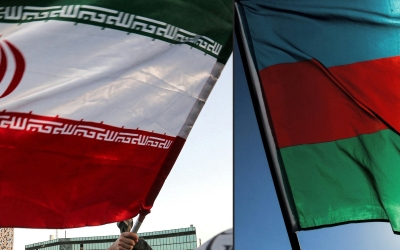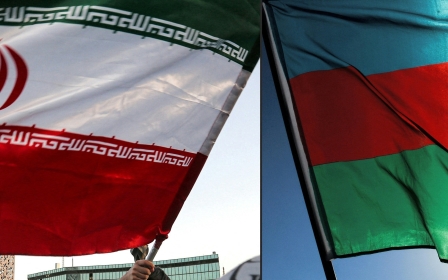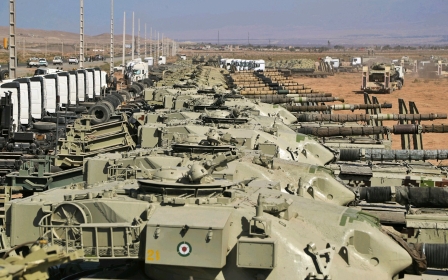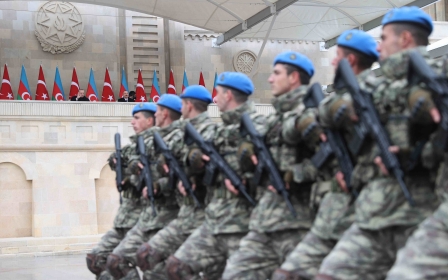Iranian press review: Tehran fury over Israel-Azerbaijan military pact

Iran warning to Israel and Azerbaijan
Iranian officials, military commanders and media from across the political spectrum have ramped up an unprecedented war of words against Iran's northwestern neighbour Azerbaijan, warning against Israel's increasing presence in the South Caucasus country.
On Friday, Iranian ground forces launched one of their largest military drills in recent years in a region bordering Azerbaijan.
Beyond the wargame, Iran's rhetoric towards Azerbaijan has been threatening.
During the drill, which was widely covered by Persian media, high-ranking military commanders openly stressed that the wargame was conducted in response to Israel's military aid to Azerbaijan.
Brigadier General Kiumars Heydari, commander of the army's ground forces, told local media that Iran had become more alert about its northwestern borders due to the increasing military collaboration between Israel and Azerbaijan.
"An uninvited and disruptive security element has come to this region, and that's the illegitimate Zionist regime," he was quoted as saying.
"Since this regime entered the region, our concerns over our borders [with Azerbaijan] have increased. Therefore, at the moment, they are under our full observation," he added.
On Sunday, Iran's Supreme Leader Ayatollah Ali Khamenei condemned Azerbaijan's military collaborations with Israel. Under the constitution, Khamenei is the commander-in-chief of all military forces in Iran.
"Those who have the illusion that they can provide security [to themselves] by being dependent on others would soon be slapped," Khamenei was quoted as saying without directly mentioning Azerbaijan.
"In any country, a direct or indirect meddling of foreign forces on the pretext of providing security, [helping with] war and peace would have a disastrous outcome," Khamenei added.
Iranians 'saved Turkey' from economic crisis
Ultra-conservative Iranian lawmaker Mojtaba Yousefi has claimed that Iranians who purchased property in Turkey over the last three years "have saved Turkey from bankruptcy".
"Between 2018 and 2020, $7bn was spent from Iran to buy property in Turkey," Yousefi wrote on Twitter, adding that this investment helped Turkey improve its financial situation amid a currency crisis that began in 2019.
Yousefi's tweet prompted many reactions among Iranians, with some accusing him of neglecting the reasons that forced ordinary people to invest their money in another country.
"The outflow of money from Iran's inflated economy to Turkey's inflated economy has a bitter message," wrote the Aftab daily's analyst Reza Bardestani.
"The message is, Iranian investors are sure that Turkey would eventually find a solution for its troubled economy, saving itself from bankruptcy. But, based on signals received from [halted] nuclear negotiations and Iran's new foreign policy, Iranian investors are sure that Iran's bad economic situation would definitely turn to something worse," he concluded.
The MP's remarks came a month after Persian media reported that several Iranian real estate agencies have moved to the Turkish cities of Istanbul, Antalya and Izmir. This summer, the housing market in many parts of Tehran came to a standstill because of high prices.
According to the report, even wealthy Iranians could no longer buy an apartment in Tehran's affluent neighbourhoods due to skyrocketing prices caused by growing inflation. At the same time, the price of the identical luxury apartments in Istanbul's wealthiest neighbourhoods was reported to be between four to five times less than in Tehran.
Corruption linked to suicide in Iran
Studies have revealed that widespread and systematic corruption in Iran is playing a significant role in the rise in suicide cases among young and middle-aged Iranians, Ardeshir Bahrami, Iranian sociologist and writer, told the ILNA news agency.
"Corruption in [Iran's] economic and bureaucratic systems plays a vital role in making people hopeless and leading them toward suicide," he was quoted as saying.
In 2019, Bahrami published the book Culture, Development and Suicide in Western Iran, about the reasons behind suicide cases in the country's impoverished and underprivileged western provinces.
According to Bahrami, 75 percent of suicides in Iran occur in poor or middle class families.
"Many of those who commit suicide and die, often several times before ending their lives, clearly say that they would kill themselves, but no one in their families hears them. The reason is that various issues hit those families," Bahrami told the news agency.
According to data gathered by the sociologist, in Iran, 71 percent of women committing suicide are younger than 40, while the number of men in the same age range stands at 80 percent.
*Iranian press review is a digest of news reports not independently verified as accurate by Middle East Eye.
Middle East Eye delivers independent and unrivalled coverage and analysis of the Middle East, North Africa and beyond. To learn more about republishing this content and the associated fees, please fill out this form. More about MEE can be found here.






